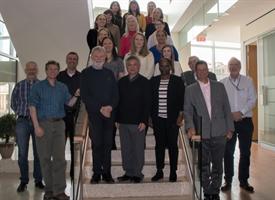STAFF REPORTS
 ROCHESTER, N.Y. — More than three decades of research in the Seychelles have consistently shown that high levels of fish consumption by pregnant mothers do not produce developmental problems in their children. The international team of researchers behind this study, one of the largest and longest population studies of its kind, is meeting this week in Rochester.
ROCHESTER, N.Y. — More than three decades of research in the Seychelles have consistently shown that high levels of fish consumption by pregnant mothers do not produce developmental problems in their children. The international team of researchers behind this study, one of the largest and longest population studies of its kind, is meeting this week in Rochester.
The Seychelles Child Development Study has transformed scientists’ understanding of the relationship between the consumption of fish rich in nutrients necessary for brain development and the possible harmful effects of mercury also found in fish. The study’s findings have global implications – fish represent the main source of protein for much of the world’s population – and challenge the long-promulgated advice of many organizations that expecting mothers moderate fish consumption during pregnancy.
“This study is a truly international and interdisciplinary collaboration that demonstrates how the combination of rigorous science and a commitment to taking the long view can help us answer important questions related to health, diet, and child development,” said Edwin van Wijngaarden, Ph.D., a professor in the University of Rochester Medical Center’s (URMC) Department of Public Health Sciences who leads the Seychelles Child Development Study.
The Seychelles, a cluster of islands in the Indian Ocean, has proven to be the ideal location to examine the potential health impact of persistent low-level mercury exposure. The nation’s 90,000 residents consume a wide variety of ocean fish at a rate 10 times greater than the populations of the U.S. and Europe. The island nation also possesses universal and free health care and education and is largely free of the industrial development that could serve as a source of pollution.
The Seychelles Child Development Study started in the 1980s as a partnership between the University of Rochester and the Seychelles Ministries of Health and Education. The nutrition unit of Ulster University in Northern Ireland joined the study about 15 years later when initial studies suggested that nutrients available in a high-fish diet may significantly influence child neurodevelopment. In 2011, researchers from the Karolinska Institute in Sweden were enlisted to allow the team to study molecular genetics of study participants.
Over the years, more than 5,000 mothers and children have enrolled in multiple study cohorts, some of which have been followed from birth until adulthood. The study has collected information on participant’s diet and nutrition, mercury exposure, educational achievement, and developmental outcomes. The study has found no consistent pattern of correlation between mercury exposure during pregnancy and adverse developmental or educational outcomes, but rather provides strong evidence that the fatty acids in fish enhance outcomes and may actually protect the developing brain from the harmful effects of mercury. These findings collectively support the view that the benefits of fish consumption during pregnancy outweigh the risks of mercury exposure.
“The study’s finding indicate that while there are many issues that impact childhood development, mercury is not likely to be one of them,” said Conrad Shamlaye, M.D., M.S., a senior scientist and advisor with the Republic of Seychelles Ministry of Health who has been involved with the study since its inception.
The study has expanded beyond its initial focus on mercury and developmental outcomes to include an investigation of various nutritional and genetic factors that may influence the metabolism of mercury and its potential influence on brain development.
The conference in Rochester will include individuals from the University of Rochester, the Seychelles Ministries of Health and Education, Ulster University, and the Karolinska Institute. Participants will review the study’s findings and accomplishments and discuss the future direction of research.
All WNY is made possible thanks to coffee and sleep deprivation.
We appreciate your readership. We like money, too.

